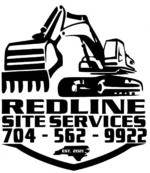Commercial site preparation is the foundation of any successful construction project in Marshville. Proper planning guarantees your project meets local regulations, stays on budget, and avoids delays. This guide explains the key steps, challenges, and solutions for commercial site preparation tailored to Marshville business owners.
What is Commercial Site Preparation?
Commercial site preparation involves transforming raw land into a buildable site. This process includes clearing debris, grading soil, and installing utilities. In Marshville, projects must follow Union County zoning laws and environmental guidelines.
Key goals:
- Create a stable base for construction.
- Prevent soil erosion and water runoff.
- Comply with local permits and safety standards.
For tailored solutions, call (704) 562-9922.
Phases of Commercial Site Preparation
1. Site Assessment and Surveys
Before breaking ground, conduct a topographic survey to map the land’s elevation, slopes, and natural features. In Marshville, surveys cost 500–500–2,000 depending on lot size.
Critical steps:
- Soil testing to check for stability and contamination.
- Identifying wetlands or protected areas regulated by the NC Department of Environmental Quality (DEQ).
2. Land Clearing and Debris Removal
Clearing involves removing trees, stumps, and existing structures. In Marshville, projects near wetlands require additional permits to protect ecosystems.
Cost factors:
- Clearing wooded land: 1,500–1,500–3,000 per acre.
- Demolishing existing buildings: 5–5–15 per square foot.
Demolition services handle safe debris disposal and recycling.
3. Grading and Soil Stabilization
Grading ensures the site has proper drainage and a level base. Marshville’s clay-heavy soil often requires lime or cement stabilization to prevent shifting.
Key tools:
- Laser-guided bulldozers for precision.
- Erosion control blankets to protect exposed soil.
Grading services help achieve slopes under 5%, as required by local codes.
4. Utility Installation
Underground utilities (water, sewer, electricity) must be installed before paving. In Marshville, 40% of project delays stem from utility conflicts.
Tips:
- Use ground-penetrating radar to locate existing lines.
- Coordinate with Piedmont Electric Membership Corp. for power access.
Common Challenges in Marshville Commercial Site Preparation
1. Strict Environmental Regulations
Marshville’s proximity to the Rocky River means projects near water bodies face stricter rules. The Clean Water Act requires permits for disturbing 0.5+ acres of land.
Solution: Partner with experts familiar with land clearing & erosion control best practices.
2. Soil Contamination Risks
Former industrial sites may contain asbestos or heavy metals. The EPA mandates soil testing for projects on land zoned “brownfield.”
Cost: Remediation averages 30–30–100 per cubic yard.
3. Permit Delays
Union County issues permits in 6–8 weeks, but incomplete applications add delays.
Checklist for permits:
- Site plans stamped by a licensed engineer.
- Stormwater management strategy.
- Traffic impact study (for projects near Highway 74).
Cost Breakdown for Commercial Site Preparation
| Task | Average Cost in Marshville | Timeframe |
|---|---|---|
| Land Clearing | $1,500–$5,000 per acre | 1–3 weeks |
| Soil Stabilization | $2–$6 per square foot | 2–4 weeks |
| Utility Installation | $10–$30 per linear foot | 4–8 weeks |
| Erosion Control | $500–$2,000 per acre | 1–2 weeks |
Septic tank services may be needed if the site lacks sewer access.
Why Hire Professionals for Site Preparation?
Marshville’s unique soil and regulatory landscape require local expertise.
Benefits of hiring us:
- Knowledge of Union County permit processes.
- Equipment for handling clay soil and steep slopes.
- Compliance with OSHA safety standards.
For example, improper grading can cause drainage issues costing $5,000+ to fix.
FAQs About Commercial Site Preparation
Q: Do I need a permit for temporary storage containers?
A: Yes. Union County requires permits for any structure onsite longer than 30 days.
Q: How deep should utility lines be buried?
A: Water lines: 3–5 feet. Electrical conduits: 2–4 feet (per National Electric Code).
Q: Can I reuse cleared trees or debris?
A: Yes. Recycling concrete saves 100–100–200 per ton in landfill fees.
Call to Action
Avoid costly mistakes with expert site preparation. Call Redline Site Services at (704) 562-9922 today for a free consultation.
Sources:
